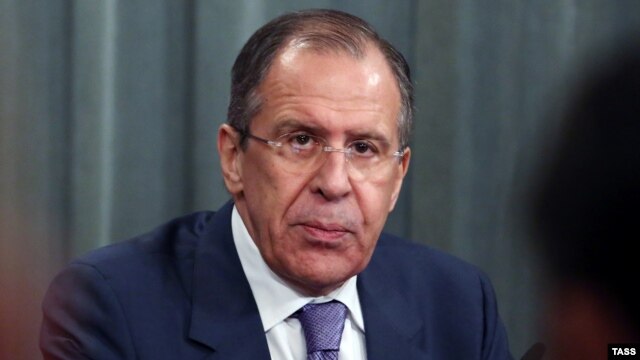Russia: Lavrov says recognition of breakaway Georgian regions irreversible
| Publisher | Radio Free Europe/Radio Liberty |
| Publication Date | 11 April 2013 |
| Cite as | Radio Free Europe/Radio Liberty, Russia: Lavrov says recognition of breakaway Georgian regions irreversible, 11 April 2013, available at: https://www.refworld.org/docid/519a6b6316.html [accessed 7 June 2023] |
| Disclaimer | This is not a UNHCR publication. UNHCR is not responsible for, nor does it necessarily endorse, its content. Any views expressed are solely those of the author or publisher and do not necessarily reflect those of UNHCR, the United Nations or its Member States. |
Last updated (GMT/UTC): 11.04.2013 14:39
 Russian Foreign Minister Sergei Lavrov
Russian Foreign Minister Sergei Lavrov
Russian Foreign Minister Sergei Lavrov has given a wide-ranging interview addressing relations with Georgia and rejecting Western criticism of Moscow's foreign and domestic policies.
In comments to Russia's RTVi television channel released on April 11, Lavrov welcomed the pragmatism of Georgian Prime Minister Bidzina Ivanishvili's government and said Moscow is ready to expand ties with Tbilisi.
But Lavrov said Moscow will not revise its decision after the brief conflict between Russia and Georgia in August 2008 to recognize the independence of Georgia's breakaway regions of Abkhazia and South Ossetia.
"There will be no Russian politician to say we should go back to what it was," Lavrov said. "That can't be, no matter what you think about it."
Turning to U.S.-Russian relations, Lavrov criticized recent legislation to punish Russian officials said to be involved in the 2009 death of whistle-blowing lawyer Sergei Magnitsky and other alleged abuses.
"I view the fact that [the U.S.] Congress literally pushed through a harsher version [of the Magnitsky Act] than the one initially proposed by [Maryland Democratic] Senator [Benjamin] Cardin not only as a manifestation of the Russophobia that is traditionally present on Capitol Hill but also as a desire to annoy [U.S. President Barack] Obama."
Moscow has rejected the Magnitsky act as meddling in its internal affairs and responded by banning U.S. adoptions of Russian children.
Lavrov also spoke of U.S. plans to develop a missile-defense shield in Europe. He said Moscow demands more clarity on the plans.
"We don't just need legal guarantees," Lavrov said. "We need an agreed list of criteria that would allow us to verify, at every concrete stage, that these guarantees are met and that the development of U.S. global missile defense corresponds to the initially declared goal, that is to respond to missile threats from outside the Euro-Atlantic region."
Washington says the shield is to protect NATO countries from attacks by rogue regimes. But Moscow says it still needs to be convinced the shield will not be aimed at Russian missiles and will undermine the country's security.
Lavrov also took aim at Western critics of Russia's prosecution of opposition leader and anticorruption blogger Aleksei Navalny.
"If we say that bloggers should be more equal, to quote [George] Orwell, than nonbloggers, then we'll have an 'Animal Farm' instead of democracy," Lavrov said. "Everyone should be equal before the law, and if there are accusations of economic misdoings, they should be investigated, whether it's a blogger or not."
Navalny, who led street protests against Vladimir Putin in late 2011, faces embezzlement and fraud charges and, if convicted, could face a prison term. Navalny's supporters claim the charges against him are politically motivated and designed to silence criticism of the government.
Based on reporting by Interfax, RIA-Novosti, ITAR-TASS, and apsny.ge
Link to original story on RFE/RL website
